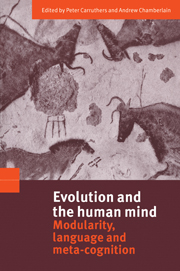Book contents
- Frontmatter
- Contents
- List of contributors
- Preface
- 1 Introduction
- 2 Massively modular minds: evolutionary psychology and cognitive architecture
- 3 Individual differences in early understanding of mind: genes, non-shared environment and modularity
- 4 Darwin in the madhouse: evolutionary psychology and the classification of mental disorders
- 5 Evolution of the modern mind and the origins of culture: religious concepts as a limiting-case
- 6 Symmetry and the evolution of the modular linguistic mind
- 7 Evolution, communication and the proper function of language
- 8 The evolution of knowledge
- 9 Mind, brain and material culture: an archaeological perspective
- 10 The evolution of strategic thinking
- 11 On the origin of the human mind
- 12 The evolution of consciousness
- 13 Evolution, consciousness and the internality of the mind
- References
- Author index
- Subject index
10 - The evolution of strategic thinking
Published online by Cambridge University Press: 18 December 2009
- Frontmatter
- Contents
- List of contributors
- Preface
- 1 Introduction
- 2 Massively modular minds: evolutionary psychology and cognitive architecture
- 3 Individual differences in early understanding of mind: genes, non-shared environment and modularity
- 4 Darwin in the madhouse: evolutionary psychology and the classification of mental disorders
- 5 Evolution of the modern mind and the origins of culture: religious concepts as a limiting-case
- 6 Symmetry and the evolution of the modular linguistic mind
- 7 Evolution, communication and the proper function of language
- 8 The evolution of knowledge
- 9 Mind, brain and material culture: an archaeological perspective
- 10 The evolution of strategic thinking
- 11 On the origin of the human mind
- 12 The evolution of consciousness
- 13 Evolution, consciousness and the internality of the mind
- References
- Author index
- Subject index
Summary
The theme of this chapter is that some seemingly arcane philosophers' disputes about the nature of rationality are relevant to questions about the evolution of strategic thinking in our species. By strategic thinking I mean, roughly, the kinds of cognitive processes that an agent uses in order to choose an action or a strategy in a situation involving other agents, taking account of the fact that the others are also choosing acts or strategies in the light of the same factors. There is a fairly familiar connection between strategic thinking and evolution in terms of considerations governing the choice of strategies that species can adopt in their interactions among themselves, for example with Maynard Smith's (1982) concept of an evolutionarily stable strategy. A crucial question will be the relation between the criteria governing choice of strategy for an evolving species and for individuals in the species. The plan of the chapter is first to present reasons for dissatisfaction with the central tool of present theories of strategic thinking, the concept of an equilibrium. There are equilibria which it would seem that intelligent creatures should avoid rather than gravitate towards. Then I argue that there is really no alternative to thinking in terms of equilibria, but that by using the concept carefully we can see how evolving intelligent creatures could cope with the situations that make it problematic.
- Type
- Chapter
- Information
- Evolution and the Human MindModularity, Language and Meta-Cognition, pp. 218 - 237Publisher: Cambridge University PressPrint publication year: 2000



